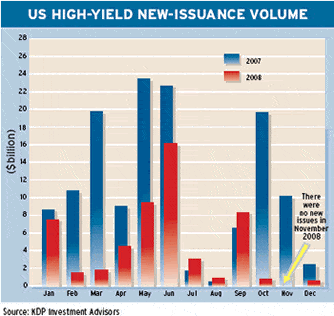 |
Government programs designed to thaw the frozen credit markets appeared to be having some effect in early January, opening a window of opportunity for a flood of investment-grade corporate debt issues, but analysts say the credit market rally will falter as the economy worsens.
“In our view, the slowdown in economic activity, coupled with the constriction in credit availability, will lead to dramatic fundamental credit deterioration,” the Barclays Capital analysts say. “In fact, we believe that the magnitude of the impending fall in credit quality could test worst-case historical precedents.”
The number of credit downgrades in Europe is already at 2002 recession levels, the analysts say. And the recession of 2002 was a mild recession, whereas the current downgrade cycle has hardly even begun, they note. Spreads on credit default swap (CDS) indexes will test, and likely exceed by a substantial margin, the widest levels they reached in November 2008, according to Barclays Capital. A CDS index is a standardized credit derivative used to hedge or take a position in a basket of debt securities.
The January thaw was triggered in part by optimism surrounding a new US administration and expectations of an economic rebound in the second half of 2009, as well as improved liquidity and lower Libor (London interbank offered) rates. US corporate bond sales surpassed $40 billion in the week ended January 9, which was the highest weekly total in nearly eight months. GE Capital sold $4 billion of bonds without government backing, the first such issue for a financial institution since November.
While investors began putting money into investment-grade corporate bonds, the high-yield bond market remained all but closed. There were two new issues in December, totaling $613 million, according to Montpelier Vermont-based KDP Investment Advisors.
Texas-based El Paso, which owns North America’s largest interstate natural gas pipeline system, raised $445 million of senior notes due December 12, 2013, with a 12% interest rate. The notes were sold at a discount, however, producing a yield of 15.25%.
“We are pleased with this important step in our progress toward meeting the company’s 2009 capital needs,” Doug Foshee, president and CEO of El Paso, said in a statement.
Kansas City Southern Railway sold $168 million of senior notes due 2013, with a 13% interest rate. The notes were sold at a discount, resulting in a yield to maturity of 16.5%.
The counterparty risk index produced by Walnut Creek, California-based CDR, an independent provider of credit research, fell to a two-month low in the first week of January but was still 12 times higher than at the start of 2007. “Tougher lending standards and rising lending costs point to continued credit contraction through 2009,” says Tim Backshall, chief strategist at CDR.
Global debt underwriting totaled $4.2 trillion last year, a decline of 38% from 2007, according to Thomson Reuters. High-yield corporate bond issuance declined 77%, while investment-grade corporate bond issuance fell 22%. For the first time on record, J.P. Morgan ranked first for global debt underwriting in 2008, followed by Barclays Capital and Deutsche Bank.
Credit default swaps (CDS) for the financial services sector were the most actively traded in the US in December 2008, led by Citi, Merrill Lynch, XL Capital and Bank of America, according to GFI, an inter-dealer broker for credit derivatives. The most active CDS in Europe in December were Gazprom, Vodafone, Deutsche Telekom, Vneshtorgbank and France Télécom.
 |
Gordon Platt



